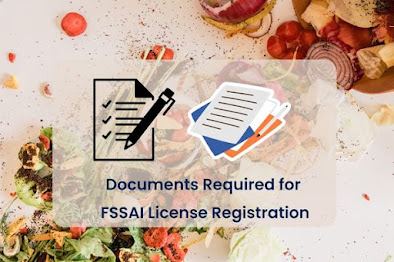Documents Required for FSSAI License Registration
Anyone active in the food industry must be FSSAI registered or foscos FSSAI. To operate a food processing, food manufacturing, packaging, distributing, or selling company, you must have an FSSAI license registration. The registration/license is provided by the Food Safety & Standards Authority of India (FSSAI), an entity that oversees food enterprises in accordance with the FSSAI Act of 2006.
Documents Required for FSSAI License
Basic FSSAI License
Photograph of an authorised individual in passport size [self-attested]
Front and back of an authorised person's Aadhar card [self-attested]
Proof of business address [rental agreement/previous month's power bill/letter from landlord]
The authorised person signs the declaration.
State & Central FSSAI License
Photographs of the directors/partners/proprietors in passport size
Director/partner/proprietor identity proof [Aadhar and PAN Card]
Proof of business address [rental agreement/previous month's power bill/letter from landlord]
Photograph of the Premises [8-9 images]
The property's blueprint
Food product list on corporate letterhead [with seal and signature]
Machine list (if any) on firm letterhead [with seal and signature].
Types of FSSAI License
Basic FSSAI License
It is the most common type of registration given for small firms with annual revenues of up to 12 lakhs. Catering enterprises, regardless of size, must apply for a state License rather than a standard FSSAI License registration.
State Fssai License
Companies with a profit of more than 12 lakhs are required to obtain a State License
Central Fssai License
The central registration is for larger enterprises with a yearly revenue of more than 20 crores. Companies that provide food to government offices/departments, as well as enterprises involved in food import/export, an internet platform, operating franchises, or hotel/restaurant chains, must get a Central License.
Benefits
It builds trust and credibility with your consumers.
Because the FSSAI mark is widely recognised, it can assure customer trust.
When FSSAI license registration is involved, hygiene and cleanliness are monitored and observed.
Better work policies can be created or improved through research to which you have access.
You will get new industry information to help you enhance your safety standards and meet the norms of international organisations.
Importing and exporting food goods require an FSSAI License.
When selling food goods online, FSSAI certification is required.
FSSAI is also in charge of developing guidelines and methods for quality assurance in authorised labs in accordance with ISO17025.
Conclusion
Everyone in the food sector, from hawkers to home vendors to large food chains, must register with FSSAI License. You must register with FSSAI whether you operate online or offline, whether you are a local player or involved in importing or exporting food items.



.png)
Comments
Post a Comment